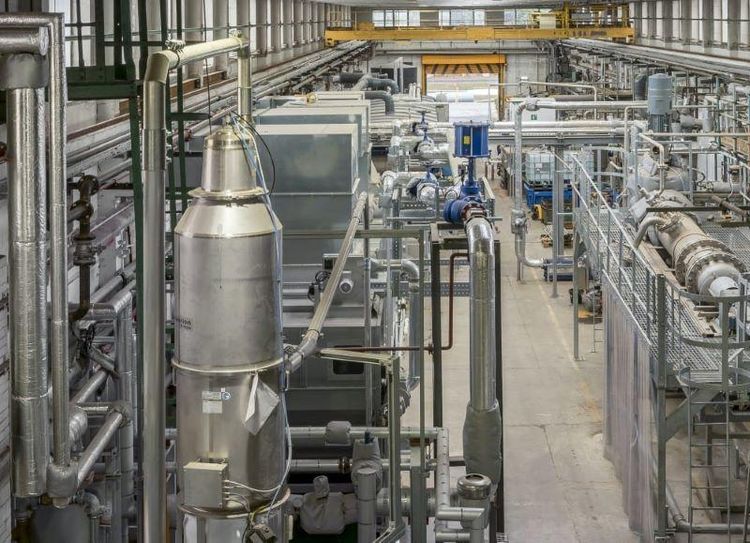Gallery: Aviation Continues to Invest in Green Initiatives | Aviation Week Network

Linda Blachly on July 25th, 2023
IAG Backs UK SAF Facility
Image courtesy of Nova Pangea Technologies Explanation: The credit for the photograph goes to Nova Pangea Technologies.

IAG, the parent company of British Airways, Aer Lingus, Iberia, Vueling, and Level, recently made a significant investment in Nova Pangea Technologies. The exact amount was not disclosed. Nova Pangea Technologies aims to establish a facility in the UK that converts agricultural waste and wood leftovers into bioethanol to produce sustainable aviation fuel (SAF). This investment will support the construction of the NovaOne waste-to-fuel plant in Teesside, located in the northeast of England. Additionally, IAG has already committed $865 million to sustainable aviation fuel initiatives.
Japan, Singapore Embrace Eco-friendly ATMs
Image source: Singapore's Civil Aviation Authority
Japan and Singapore's air traffic control organizations have decided to adopt environmentally friendly air traffic management for all flights between Singapore and Tokyo. This move is a result of the efforts by the Civil Aviation Authority of Singapore (CAAS) and the Japan Civil Aviation Bureau (JCAB) to increase air transportation services between the two countries as they recover from the pandemic. The photo shows CAAS Director-General Han Kok Juan shaking hands with JCAB Senior Deputy General-Director Onuma Toshiyuki at the CAAS corporate office.
UK Research Center Aims For Carbon-neutral Aviation
Image attribution: University of Cambridge The blog post attempts to rephrase the given section using alternative vocabulary: Acknowledgment: University of Cambridge
A brand-new research center in the UK is being constructed with the aim of speeding up the advancement of aerospace technology focused on achieving carbon-neutral aviation. With a generous funding of £58 million ($73 million), the University of Cambridge is establishing the Whittle Laboratory, which will bring together researchers, students, businesses, and innovators in close proximity to manufacturing spaces and areas designated for experimentation. Expected to open its doors in October 2025, the lab will also include the National Center for Propulsion and Power, a cutting-edge testing facility.
Ryanair, Repsol To Boost SAF Provision
Image source: Ryanair/Piotr Mitelski Blogpost credit: Ryanair/Piotr Mitelski
Ryanair, an Irish low-cost carrier, has partnered with Repsol, a global energy company, to enhance the availability of Sustainable Aviation Fuel (SAF) at its airports in Spain and Portugal. Through this partnership, Ryanair will have access to a potential supply of 155,000 tons (52 million gallons) of SAF from 2025 to 2030. This amount is equivalent to over 28,000 flights lasting approximately 150 minutes, and is expected to result in a reduction of approximately 490,000 tons of CO2 emissions.
Jet2 Supports Fulcrum SAF Expansion
Credit for the photo goes to Fulcrum Bioenergy.
Jet2.com, a leisure airline based in the UK, has made a financial commitment to the Fulcrum NorthPoint facility, a sustainable aviation fuel (SAF) production plant located in northwest England. As part of the agreement, Jet2.com, which also operates Jet2holidays, will acquire a share in the Fulcrum plant and will have access to over 200 million liters (53 million gallons) of SAF over the course of 15 years. Production of SAF is projected to commence in 2027 at the Fulcrum facility.
Norwegian Teams Up With Norsk E-Fuel For SAF
Norwegian Air Shuttle and Norsk e-Fuel have partnered to construct a sustainable aviation fuel (SAF) facility. Norwegian plans for the initial large-scale e-fuel plant, situated in the northern region of Mosjøen in Norway, to commence SAF production as soon as 2026.
Wizz Air Backs Biofuel Venture
Image attribution: Wizz Air The blog post could be rephrased as follows: Acknowledgement: Wizz Air
Wizz Air, a company based in Hungary, is making a financial investment of £5 million ($5.5 million) in Firefly, a biofuel company. Firefly's goal is to create sustainable aviation fuel (SAF) using sewage. Through their partnership, Wizz Air will be able to provide SAF to their operations in the UK starting in 2028. They plan to supply up to 525,000 tons of SAF over a span of 15 years, leading to a potential reduction of 1.5 million tons of CO2 emissions. In Brazil, Acelen has plans to invest over 12 billion reals ($2.38 billion) in the next decade to modernize their Mataripe refinery located in Bahia. The refinery will be able to produce 1 billion liters (264 million gallons) of renewable fuel annually, including SAF. Production is set to begin in early 2026.
Cepsa & Bio-Oils Join Forces
The energy company Cepsa and Bio-Oils, the proud owner of a refinery in Huelva, Andalusia, Spain, have come together to create a collaborative project. Their aim is to inject a substantial amount of €1 billion ($1.1 billion) into the plant, aiming to produce a whopping 500,000 metric tons (165 million gallons) of SAF and renewable diesel annually. The production process is set to commence in the initial six months of 2026.
Canada’s Raven & Cap Clean Energy Corp. Join Forces For Biofuels
Image courtesy of Raven SR The photo shown has been credited to Raven SR.
Canada is experiencing an increase in the production of Sustainable Aviation Fuels (SAF) thanks to a collaboration between renewable fuels company Raven SR and Cap Clean Energy Corp, based in Calgary, Alberta. They have signed an agreement to work together in developing biofuels facilities in Canada that will specifically cater to the heavy-duty transport sector, producing SAF and renewable diesel. This partnership will enable Cap Clean to manufacture top-notch renewable fuels for the challenging transportation sector, utilizing a range of biomass and bio-waste feedstocks. The use of modular systems will also allow for swift scaling up of production.
Canada's Biofuel Collaboration: SAF+ Consortium
Image source: SAF+ Consortium The consortium called SAF+ has recently been making waves in the industry. Their innovative and forward-thinking approach has caught the attention of many professionals. With their cutting-edge technology and collaborative mindset, they aim to revolutionize the field. The SAF+ Consortium is paving the way for new opportunities and advancements in the industry. Their dedication and commitment to excellence are evident in their work. Stay tuned for exciting updates from the SAF+ Consortium as they continue to make a remarkable impact in their field.
Airbus Canada, Pratt & Whitney Canada, and SAF+ Consortium (CADAQ-100) have joined forces to work together on advanced Sustainable Aviation Fuel (SAF) development. The Quebec government is providing support for this new initiative. The main focus areas of this collaboration include conducting research and testing on SAF, including flight trials where blends of SAF up to 100% will be tested on an Airbus A220 equipped with Pratt & Whitney GTF engines. Additionally, the project will involve exploring the feasibility of establishing local production facilities in Quebec for power-to-liquid e-SAF.
Boeing Broadens EcoDemonstrator Initiative
Boeing is broadening its ecoDemonstrator initiative to incorporate "Explorer" platforms that will concentrate on brief experimentation with a particular technology. The inaugural Boeing ecoDemonstrator Explorer will be a Boeing 787-10, and it will engage in an exercise focused on operational efficiency in June. This exercise will entail flight tests from Seattle to Tokyo, Singapore, and Bangkok. The main goal is to illustrate how synchronized navigation across worldwide airspace jurisdictions can enhance operational efficiency. This in turn can lead to a reduction of up to 10% in fuel consumption and emissions for an aircraft.
Vistara Flies Eco-friendly With Premier 787
Vistara, an airline based in India, successfully executed a flight within the country using a Boeing 787 aircraft. This flight originated from Indira Gandhi International Airport in Delhi and arrived at Chhatrapati Shivaji Maharaj International Airport in Mumbai on May 4. What made this flight particularly noteworthy was that it was powered by a combination of Sustainable Aviation Fuel (SAF) and regular fuel. This marked the very first time a widebody aircraft in India was flown for commercial service with this blend of fuels.
Higher SAF Usage By United Airlines
Image source: United Airlines
United Airlines is increasing its utilization of SAF (Sustainable Aviation Fuel), as it intends to incorporate a blend of SAF on outgoing flights from San Francisco International Airport (SFO). Moreover, they have future plans to implement a SAF blend at London Heathrow Airport (LHR) later this year. This development could potentially result in United Airlines utilizing around 10 million gallons of SAF in 2023. This impressive figure is almost triple the amount used in 2022 and nearly tenfold the amount used in 2019.
JAL Embraces Blended SAF From NGO
Image credit: Trevisan Aviation Images / Alamy Stock Photo
In Asia, Japan Airlines (JAL) will be the pioneer airline to utilize a mixture of Sustainable Aviation Fuel (SAF) from Nagoya Chubu Centrair Airport (NGO), as an initiative by the Japanese transport ministry to show the blending of SAF within the country. The Civil Aviation Bureau of the Ministry of Land, Infrastructure, Transport and Tourism acquired 5,000 liters (1,300 gallons) of pure SAF from Neste and processed it into a blend at a facility owned by Fuji Oil Company. The blended fuel was then sold to JAL and All Nippon Airways (ANA) by trading firm Itochu.
The aviation sector remains committed to investing in sustainable aviation fuels (SAF) and other eco-friendly initiatives as the deadline for achieving net-zero goals approaches.
Linda Blachly holds the position of Senior Associate Editor at Air Transport World as well as Aviation Week. She became a part of the organization in July 2010 and is in charge of creating articles for Air Transport World's monthly publication and captivating material for aviationweek.com. Her work is carried out from the Washington DC branch.







































































